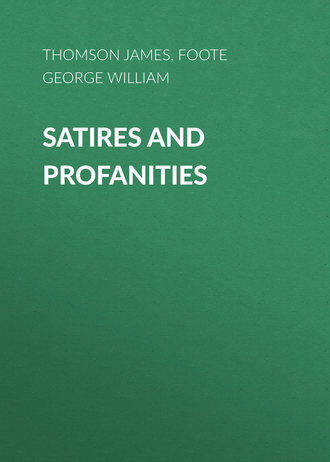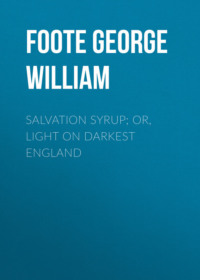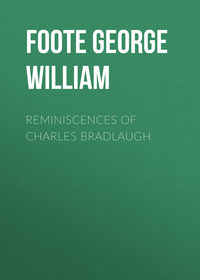 полная версия
полная версияSatires and Profanities
I must not omit to mention that I have been told on authority, which I incline to consider good, that in the said gorgeous sanctum is conspicuous a table of commandments, wrought in letters of fine gold, which commandments are these:
I. Thou shalt never be in earnest about anything, and shalt abhor enthusiasm.
Thou shalt not have a decided opinion on any subject.
III. Thou shalt never write an unqualified sentence, or risk an unmodified statement.
IV. Thy style shall be always in the tone of a sweet murmur or soft whisper; a lullaby of peace for drowsy-headed Bumbledom.
V. Thou shalt write with an air of assured superiority to everybody, and everything.
VI. Thou shalt ever bear in mind that there is no joy but calm, and that the supreme moral excellence is good taste, which may be quite compatible with meanness, servility, and cowardice, but cannot be compatible with the foolish fervor of zeal.
VII. Thou shalt always mention and allude to as many persons, places, and luxuries of high life as possible.
VIII. Thou shalt drag into every article three or four literary citations or allusions, whether relevant or irrelevant, in order to show to the world thy culture.
IX. Thou shalt carefully avoid mention of all ardent reformers and unpopular thinkers, and their doings, save to lightly banter or coldly rebuke them.
X. Thou shalt treat with profound respect and tenderness all the powers that be, and all popular opinions, social, political and religious, however thou mayest contemn them in thy heart; for great Bumble is the sole lord of large circulations, and only through his continued grace can our circulation continue to increase.
It is by assiduously conforming themselves to this most wise and holy decalogue, that the members of the staff of the Daily News have become such rare flowers of sweetness and light; worthy of that serene Professor of Haughty-culture, Matthew Arnold himself, ere he had perpetrated “Literature and Dogma.”
But while, in common with all the other worshippers of the Daily News, I exult in its world-wide and ever-increasing circulation, I am haunted by a horrible fear, which I cannot conceal, but will hint and whisper as gently as possible. When a stone falls into a pond – but no, pond is vulgar – when a stone falls into a still lake, the first small rings are clearly defined, but the circlings as they enlarge grow fainter and fainter, until at length they can no more be perceived. Now, as all the world knows, our beloved and revered Daily News, in its ever-increasing circulation, has hitherto followed precisely the same law; and my dread is that it will continue to do so unto the utmost extremity, becoming ever more and more faint and undefined as the circulation increases, until it shall altogether vanish away. It is getting so refined that I fear it will soon be fined away to nothing; so delicate and dainty, that it is already unfit for this rough world, whose slightest shock may kill it; so ethereal that its complete evaporation seems imminent; so supernal that it must surely soon disappear, absorbed into the Empyrean. May that good God, who we have been told “will think twice before damning a person of quality,” think many, many times before condemning our fashionable world to such an irreparable loss!
JESUS: AS GOD; AS A MAN
(1866.)
“These hereditary enemies of the Truth… have even had the heart to degrade this first preacher of the Mountain, the purest hero of Liberty; for, unable to deny that he was earth’s greatest man, they have made of him heaven’s smallest god.” – Heine: Reisébilder.
The doctrine of the divinity of Jesus, which, in whatever relation regarded, is full of self-contradictions and absurdities, is, above all, pernicious in its moral and spiritual results. Most myths have a certain justification in their beauty, in their symbolism of high truth. This one distorts the beauty, degrades the sublimity, stultifies the meaning of the facts and the character wherein it has been founded, taking away all true grandeur from Jesus, benumbing our love and reverence.
Jesus, as a man, commands my heart’s best homage. His words, as reported by the Evangelists, are ever-flowing fountains of spiritual refreshments; and I feel that he was in himself even far more wise and good than he appears in the gospel. What disciple could be expected to report perfectly the words of a teacher so mystically sublime? The disciple intends and endeavors to report faithfully; but when he hears words which to him are without sense, because they express some truth whose sphere is beyond the reach of his vision, he makes sense of them by some slight change – slight as to the letter, immense as to the spirit; for the sense is a truth or truism of his own lower sphere. And when the reports are not put into writing until many years after the words were first uttered, the changes will be important even as to the letter; for a narrative from a man’s mouth always alters year after year as much as the man himself alters, for he continues grafting his own sense (which may be deplorable nonsense) upon words which have been spoken. When we find sentences of the purest beauty and wisdom in the records of a man’s conversation, we may safely proportion the whole philosophical character of the speaker to such sentences. They mark the altitude at which his spirit loved to dwell. We are but completing the circle from the clearest fragment-arc left. Sentences of wisdom less exalted, or of apparent unwisdom, have perhaps been degraded by the reporter, or have been relative to circumstances which we cannot now learn thoroughly.
Jesus as a man, whose words have been recorded by fallible men, is not lowered in my esteem by such contradictions as I find between his various speeches. Every proverb has its antagonist proverb, each being true to a certain extent, or in certain relations. Could we conceive an abstract intellect, we might conceive it dwelling continually in the sphere of abstract and absolute truth; but no man, however wise, dwells continually in this sphere. As a man living in the world, his intellect no less than his body lives in the relative and the conditioned, and naturally reflects the character of this sphere. The wise man finds himself surrounded and obstructed by certain concrete errors, and he attacks these errors with relative truths. Were the errors of another sort, the truths commonly in his mouth would be of another sort too. Many wise men of different ages and countries are pitted against each other as if their doctrines were fundamentally antagonistic, while, in truth, their doctrines are essentially in unison, and either would have spoken or written much the same as the other had he lived in the same circumstances. For a wise man only attacks the errors that are in his way; things which he never meets he can scarcely think of as obstructions. Hannibal, whose business it is to get into Italy from Gaul, sets about blasting the Alps. Stephenson, whose business it is to get from Manchester to Liverpool, sets about filling up Chat Moss. The same man, who muffles himself in as many furs as he can get in Greenland, will strip himself to a linen robe in Jamaica. Luther said that the human mind is like a drunken peasant on horseback: he is rolling off on the right, you push him up, he then rolls over on the left. Exactly so; and because one sage, seeing him roll down to the right, has pushed him up on the right, while another sage, seeing him roll down to the left, has pushed him up on the left, are the two sages to be accounted antagonists? Now as a wise man in the course of his existence meets errors of many sorts, some of a quite opposite tendency to others, and as he proves his wisdom by applying to each error its relative or pertinent truth, the rule is almost rigidly exact: that the wiser the man the more of apparent contradictions can be found in his writings or conversation treating of actual life.
But deity is beyond the sphere of the relative and conditioned. When deity speaks and deity reports the speeches, all should be absolute truth transparently self-consistent, else what advantage or gain have we by the substitution of God for Man? Why bring in God to utter and record what could have been as well uttered and recorded by man?
Everything for which we love and venerate the man Jesus becomes a bitter and absurd mockery when attributed to the Lord Christ. The full heart is praising the man; you turn him into God, a ruinous salvo is added to the praise.
He went about doing good: if God, why did he not do all good at once? He cured many sick: if God, why did he not give the whole world health? He associated with publicans and sinners: if God, why did he make publicans and sinners at all? He preached the kingdom of heaven: if God, why did he not bring the kingdom with him and make all mankind fit for it? He loved the poor, he taught the ignorant: if God, why did he let any remain poor and ignorant? He rebuked the Pharisees and Sadducees: it God, why did he not wholly purify them from formalism, hypocrisy, and unbelief? He died for love of mankind: if God, why did he not restore mankind to himself without dying? and what great thing was it to seem to die for three days? He sent apostles to preach salvation to all men: if God, why did he not reveal it at once to all men, and so reveal it that doubt had been impossible? He lived an example of holiness to us all: if God, how can our humanity imitate Deity? And finally, a question trampling down every assertion in his favor: why did he ever let the world get evil?
One is ashamed of repeating these things for the ten-thousandth time, but they will have to be repeated occasionally, so long as a vast ecclesiastical system continues to rest on the foundations of the absurdities they oppugn. And while one is grinding such chaff in the theological mill, he may as well have a turn at the Atonement, which is, in fact, the essence of the dogma of the Incarnation. No wonder this poor Atonement has been attacked on all sides; it invites attack; one may say that in every aspect it piteously implores us to attack it and relieve it from the misery of its spectral existence. It is so full of breaches that one does not know where to storm.
I am content to note one aspect of this unfortunate mystery which, so far as I am aware, has been seldom studied. The whole scheme of the Atonement, as planned by God, is based upon a crime – a crime infinitely atrocious, the crime of murder and deicide, is essential to its success: if Judas had not betrayed, if the Jews had not insisted, if Pilate had not surrendered, if all these turpitudes had not been secured, the Atonement could not have been consummated. Need one say more? Sometimes, when musing upon this doctrine, I have a vision of the God-man getting old upon the earth, horribly anxious and wretched, because no one will murder him. Judas has succeeded to a large property, and would not be tempted to betray him by three hundred pieces of silver; the chief priests and elders think him insane, and, therefore, as Orientals, hold him in a certain reverence; Pilate is henpecked and superstitious, accounts the wife’s dreams oracular, and will have nothing to do with him; even Peter won’t deny him, although he has restored Peter’s mother-in-law to life. The situation is desperate; he has again and again prayed his Father to despatch a special murderer to despatch him, yet none appears: shall he have to perish by old age or disease? may he be compelled to commit suicide? must he go back to Heaven unsacrificed, foiled for want of an assassin?
Benjamin Disraeli attained the cynical sublime when he suggested a monument of gratitude to Judas. In fact, Christendom ought to have erected hundreds of years ago three grand monuments to the sub-trinity of Christianity, to the three men without whose devoted assistance the heavenly trinity would not have triumphed in the scheme of Salvation by Atonement; Judas, Caiaphas and Pilate; and as these three men could not have done what they did in furtherance of the glorious work without a well-known inspiration, a fourth memorial – the grandest of all – should have been erected to the Devil. But the world, even the religious world, has always been ungrateful to its most generous benefactors.
Is it not the worst of sacrilege, a foul profanation of our human nature, which for us, at least, should be holy and awful, when the heroic and saintly martyrdom of a true Man is thus falsified into the self-schemed sham sacrifice, ineffectual, of a God? The people who profess belief in this are shocked at the outrage offered to our humanity by the Development Theory, while they themselves commit this outrage more flagitious. Little matters whence we sprang; we are what we are. But much matters to what we may attain. If the Development Theory plants our feet in the slime, the Christian Theory bows our head to the dust. It asserts that human nature could not possibly be so good as Jesus, that human genius could not possibly write the books which tell of him; it denies us our noblest prerogatives, and declares us bastards when we claim a crown. It climbs to God by trampling on Man, it builds Heaven in contempt of Earth, its soul is a phosphorescence from the slain and rotting Body; its fervent faith vilifies us worse than the coldest sneer of Mephistopheles. Yet the orthodox shudder and moan, outraged in their pious sensibilities, when one dares to speak with manly plainness of their doctrines, which commence by polluting our common nature, continue by insulting our reason, and conclude by damning the large majority of us!
THE ONE THING NEEDFUL
(1866.)
When I survey with pious joy the present world of Christendom, finding everywhere that the true believers love their neighbors as themselves and are specially enamored of their enemies; that no one of them takes thought for the morrow, what he shall eat or what he shall drink, or wherewithal he or she shall be clothed; that all the pastors and flocks endeavor to outstrip each other in laying not up for themselves treasures upon earth, where moth and rust corrupt, and where thieves break through and steal; and all are so intensely eager to quit this earthly tabernacle and become freeholders of mansions in the skies; when I find faith as universal as the air, and charity as common as cold water; I sometimes wonder how it is that any misbelievers and unbelievers are left, and feel astonished that the New Jerusalem has not yet descended, and hope that the next morning’s Times (rechristened The Eternities) will announce the inauguration of the Millennium.
What delayeth the end? Can there indeed be any general hindering sin or imperfection among the pure saints, the holy, unselfish, aspiring, devout, peaceful, loving men and women who make up the population of every Christian land? Can any error infect the teachings of the innumerable divines and theologians, who all agree together in every particular, drawing all the same doctrines from the same texts of the one unvaried Word of God? I would fain believe that no such sin or error exists, not a single inky spot in the universal dazzling whiteness; but then why have we to deplore the continued existence of heathens and infidels? why is the New Jerusalem so long a-building? why is the Millennium so long a-coming? why have we a mere Sardowa instead of Armageddon?
After long and painful thought, after the most serious and reverent study, I think I have found the rock on which the ship of the Church has been wrecked; and I hasten to communicate its extreme latitude and interminable longitude, that all Christian voyagers may evade and circumvent it from this time forward.
The error which I point out, and the correction which I propose, have been to a certain extent, in a vague manner, pointed out and proposed before. A clergyman named Malthus, not in his clerical capacity, but condescending to the menial study of mundane science, is usually considered the first discoverer. But mundane science is conditioned, limited, vague, its precepts are full of hesitation; while celestial science is absolute, unlimited, clear as the noonday sun, and its precepts are imperiously forthright.
It seems to me that the one fatal error which has lurked in our otherwise consummate Christianity, and which demands immediate correction is this, that the propagation of children is reconcileable with the propagation of the faith – an error which while it lasts adjourns sine die the day of judgment, and begins the Millennium with the Greek Kalends.
One need not quote the numerous texts throughout the New Testament (let Matthew xix., 12, suffice) proving that Jesus and the epistolary apostles accounted celibacy essential to the highest Christian life. One only of the disciples, so far as we know, was married; and he it was who denied his master; and most of the more profound divines consider that Peter was justly punished for marrying, when Christ cured his mother-in-law of that fever which might else have carried her off.
But many modest people may be content with a respectable Christian life which is not of the very highest kind. They may think that as husbands and wives they will make very decent middle-class saints in heaven, after a comfortable existence on earth, leaving the nobler crowns of holiness for more daring spirits. Humility is one of the fairest graces, and we revere it; but there is a consideration, most momentous for the kind Christian heart, which such good people must have overlooked – very naturally, since it is very obvious.
Jesus tells us that many are called but few are chosen; that few enter the strait gate and travel the narrow way, while many take the broad way that leadeth to destruction. In other words, the large majority of mankind, the large majority of even those who have the gospel preached to them must be damned. When a human soul is born into the world, the odds are at least ten to one that the Devil will get it. Can any pious member of the Church who has thought of this take the responsibility of becoming a parent? I thoroughly believe not. I am convinced that we have so many Christian parents only because this very conspicuous aspect of the case has not caught their view. If the parents could have any assurance that the piety of their offspring would be in proportion to their own, they would be justified in wedding in holiness. But alas! we all know that some of the most religious parents have had some of the most wicked children. Dearly beloved brethren and sisters pause and calculate that for every little saint you give to heaven, you beget and bear at least nine sinners who will eventually go to hell.
The remedy proposed is plain and simple as a gospel precept: let no Christian have any child at all – a rule which, in the grandeur of its absoluteness makes the poor timid and tentative Malthusianism very ridiculous indeed. For this rule is drawn immediately from the New Testament and cannot but be perfect as its source.
Let us think of a few of the advantages which would flow from its practice. The profane have sometimes sneered that Jesus and his disciples manifestly thought that the world would come to an end, the millennium be inaugurated, within a very few years from the public ministry of Jesus. Luckily the profane are always ignorant or shallow, or both. For, as the New Jerusalem is to come down while Christians are alive, and as Christians in the highest sense or Christians without offspring must have come to an end with the first generation, it is plain that the belief which has been sneered at was thoroughly well founded; and that it has been disappointed only because the vast majority of Christians have not been Christians in the highest sense at all, but in their ignorance have continued to propagate like so many heathen proletarians.
Now, supposing the very likely case that all Christians now living reflect upon the truth herein expounded, and see that it is true, and, therefore, always act upon it, it follows that, with the end of our now young generation, the whole of Christendom will be translated into the kingdom of heaven. Either the mere scum of non-Christians left upon the earth will be wholly or in great part converted by an example so splendid and attractive, and thus translate all Christendom in the second edition in a couple of generations more; or else the world, being without any Christianity, will, as a matter of course, be so utterly vile and evil that the promised fire must destroy it at once, and so bring in the New Heavens and New Earth.
Roman Catholic Christians may indeed answer that, although the above argument is irresistible to the Protestants, who have no mean in the next life between Heaven and Hell, yet that it is not so formidable to them, seeing that they believe in the ultimate salvation of nearly every one born and reared in their communion, and only give a temporary purgatory to the worst of their own sinners. And I admit that such reply is very cogent. Yet, strangely enough, the Catholics, even more than the Protestants, recognise and cultivate the supreme beatitude of celibacy; their legions of unwedded priests, and monks, and nuns and saints are so many legions of concessions to the truth of my main (arguement).
I am aware that one of the most illustrious dignitaries of our own National Church, the very reverend and reverent Dr. Swift, Dean of St. Patrick’s, has advocated on various grounds, and with impressive force of reasoning, the general eating of babies: and I anticipate that some prudent Christians may, therefore, argue that it is better to get babies and eat them than to have none at all, since the souls of the sweet innocents would surely go to heaven, while their bodies would be very nourishing on earth. Unfortunately, however, the doctrine of Original Sin, as expounded and illustrated by many very thoughtful theologians, and specially theologians of the most determined Protestant type, makes it very doubtful whether the souls of infants are not damned. It will surely be better, then, for good Protestants to have no infants at all: Q. E. D.
THE SWINBURNE CONTROVERSY
(1866.)
Not having read Mr. Swinburne’s “Poems and Ballads,” I have nothing to say on the special case in which they are involved. A few of the adverse critiques I have chanced to see, and these almost avail to convince one that Mr. Swinburne is a true poet. The Saturday Review, shocked out of the complacency of its stark peevishness, cried, “Pretty verses these to read aloud to young ladies in the drawing-room!” As if there were any great book in existence proper to read aloud to young ladies in drawing-rooms! and as if young ladies in drawing-rooms were the fit and proper judges of any great book! I should like to watch the smuggest and most conceited of Saturday Reviewers attempting to read aloud to young ladies in a drawingroom certain chapters in the Bible, certain scenes of Shakespere, certain of the very best passages in Chaucer, Spenser, Dryden, Pope, Swift, Fielding, Sterne, Smollett, Burns, Byron, Shelley. When Mr. Swinburne answers that he writes for full-grown men and women, the acute Fun affirms that men have read his book and have condemned it. As if our present brood of periodical critics were men! At home in private life, some of them probably are; but in their critical capacity, that is to say incapacity, how many of them have any virility? The Athenaeum squashes the detestable book by proclaiming that it contains such and such things in the style of Alfred de Musset, George Sand, Victor Hugo, Ovid, etc.; that is to say, in the style of some of the best Latin and modern French writers! As for Punch, he makes a joke worthy of his present lively condition (were it not for Mr. C. H. Bennett, one would say that there was no blood at all left in Mr. Punch when the great Leech dropped off), suggesting that the author should take the appropriate name of Swine-born. But the mass of our present critics are so far beneath contempt that we will waste no more time upon them.
I have just one remark to make, however, before saying a few words on the general issue raised by this particular process. A large number of highly respectable elderly personages in gowns, for the most part belonging to the priesthood of our very dear National Church, and who by themselves and by good Bumbledom in general are accounted the real clerisy of England, have devoted all, or nearly all, the years of their maturity to what is termed the classical instruction of ingenuous youth. The ingenuous youth thus magnificently instructed comprise young men of the highest rank, with the most money and leisure and the reddest blood in the nation. Is it not rather ludicrous to see the said begowned elderly personages all wringing their hands and smiting their breasts, weeping and lamenting in sore astonishment and perplexity and terror, when one of these young men dares to give sign that he has actually in some degree assimilated such classical instruction, instead of merely gulping it down hastily and then vomiting it all crude at the examinations?









